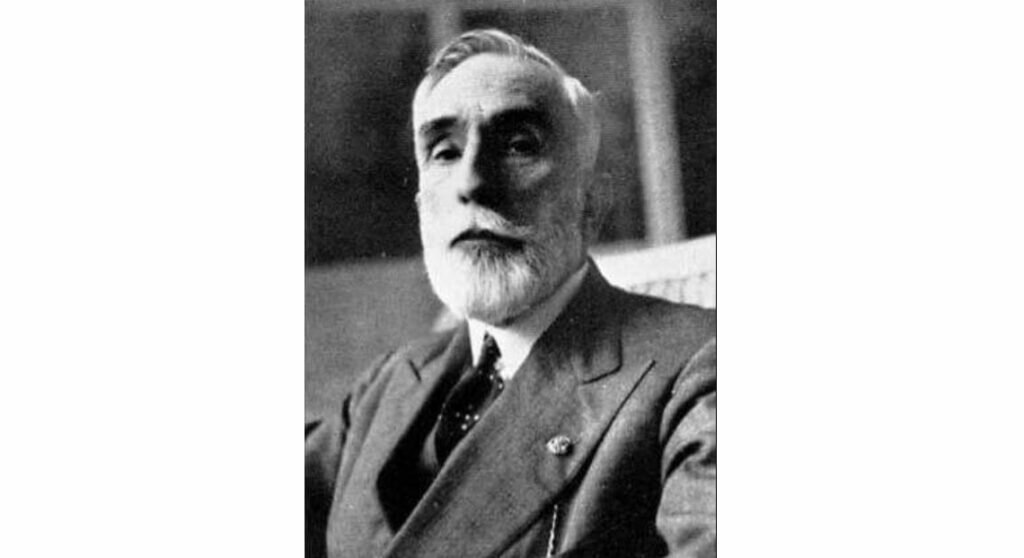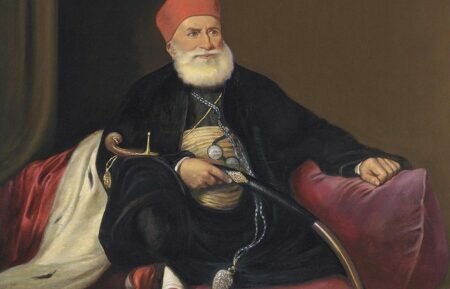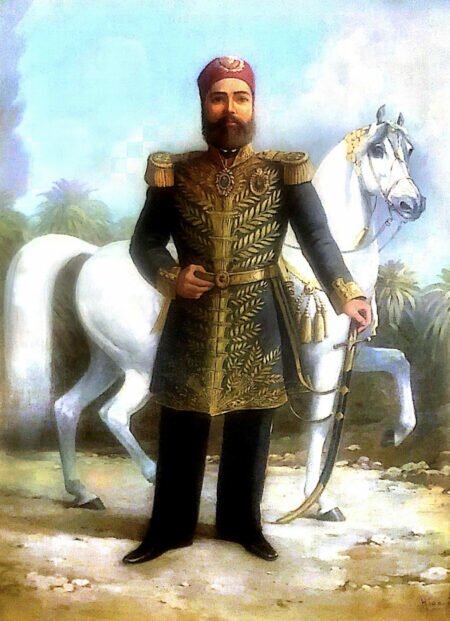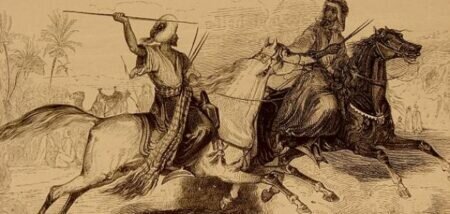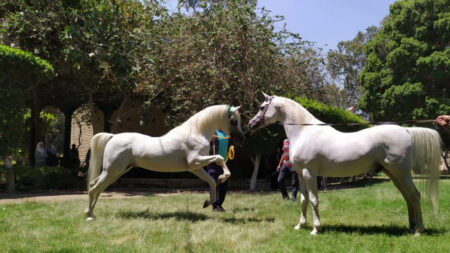In the second part of his book “Arab Horse Breeding in Egypt,” Prince Muhammad Ali Tawfiq describes equestrian games in the Egyptian country, saying: In the past, there was a game called “The Jereed Game,” and it was played by the Kurdish butchers who were used by princes and princesses as guards for women.
These skilled knights would accompany the princesses’ chariots on official holidays and in parties, and they would gather in the uncultivated space in Shubra, which was at that time the Egyptian Park, and they would play their games there in the afternoon, but after the occupation the slavery championed, and gradually the women’s house disappeared, and there is no longer there It is necessary to use this guard, and therefore this game disappeared with them.
In Egypt, as in the Arab countries, especially in North Africa, the Bedouins form at large weddings small groups of six or eight horsemen who attack each other and shoot guns, which is called “playing gunpowder.” This comic war aroused the feeling of the spectators, especially the women, and the knight among them stood on the saddle while his horse ran, then fired the gun, and some were lying on the horse’s side, so that the gun barrel appeared in front of the horse’s chest, and then fired it while he was in this position.

These games were widespread at a time when there were many Bedouins in Egypt, and among them were knights skilled in this kind of sport, but since they left the Bedouin life, and moved to the cities, and worked in cultivating the land as farmers, equestrian and its games have disappeared.
Prince Muhammad Ali Tawfiq goes on to say: My father used to travel to Alexandria for the summer resort, and at every station the train stopped at: Banha, Tanta, Kafr El-Zayat and Damanhour, he was received by the Arabs on both sides of the road, while they were riding their horses, and they ran with the train as it traveled for a distance of two kilometers while they fired their guns. I remember that one of the Bedouin chiefs called the Egyptian from Tanta had a white horse famous for its speed and endurance, and he was proud of it, and he always kept pace with the train for a distance of three kilometers or more; To prove that he is better than others.
Al-Hawara horse sports, as described by Prince Muhammad Ali Tawfiq
Prince Muhammad Ali Tawfiq, in the second part of his book “Arab Horse Breeding in Egypt,” dealt with the sport of Hawara, and said: There is another sport that some of the people of Upper Egypt called Hawara, and these horsemen train their horses to perform many tricks, some of them train their horses to stand on The hind legs, while striking the other horse and its rider with its front legs, as a kangaroo does, and others train their horses to dance to the tunes of music, or lying on the ground, or sitting on helplessness and twisting with the front legs, and other tricks, and some of these knights continue to perform these games until old age;
Prince Muhammad Ali Tawfiq adds: I remember that he once invited us to the late Omar Pasha Sultan in the direction of Minya in (Jumhana). To fight with another horse and his rider, but unfortunately his opponent’s horse kicked him, and he fell unconscious, and we thought that he had died, but we are pleased that his turban was the reason for his survival from a heavy injury.
There are also in Lower Egypt, near Kafr El-Zayat, rich knights who do not master these tricks for gain, but for hobby only. I was told that this hobby was inherited from their fathers and grandfathers, generation after generation, and I will strive to prove here some solar images of these games; To give the reader an idea of their skills, and all he regrets is that the way in which they train their horses on these tricks is devoid of pity, but with all that one is compelled to praise the bravery and skill of these horsemen as they perform these tricks to the tunes of music.
Horses attacking the drummer.. From the book “Arab Horse Breeding in Egypt”
Prince Muhammad Ali Tawfiq spoke in his book “Arab Horse Breeding in Egypt” about the entertaining games associated with horses, including training the horse to attack the (drummer) and bite the drum and pull it from its holder, and said: The funny thing is that the horse attacks the drum, and the drummer who knows this strives to He disappears from his path, but the horse still follows him until he approaches the drum, grabs it and takes it from the man.
Many of these games take place at wedding ceremonies in various villages in Upper Egypt, and the knights come to them from other nearby destinations, and they participate in these parties by performing some tricks; And that out of jealousy and competition, and each would like to outdo the other, so every country praises its knights.
He followed by saying: And what I fear most is that these games will wither over time, and be dominated by “automobiles” and mechanical transportation that replaced horses in Egypt, as it is in other countries.
Al-Tahawiyah: Knights that are not dusty.
In the context of talking about horses, we should not fail to mention that some of the Bedouin tribes in Egypt have worked a lot for racing and hunting, and these Arabs are the Tahawiyya in the Salhia region, adjacent to the Suez Canal region. They are riders that do not break the dust, they love horses, and they have good examples of them. They practice hunting deer by falcon on horses, and they train their horses to race, and their horses often win the race canes in the racing fields in Egypt and Alexandria.
I feel that I owe a small word of praise to these people; Because whoever loves horses and loves sports appreciates everything they do to preserve the qualities and glory of Arabs and Arabian horses.


